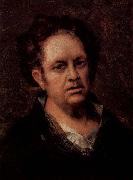
Oil On
Canvas, Real Flavor of Old Masters
|
Francisco de Goya
|
|||
|
|
|||
| Spanish 1746-1828 Francisco de Goya Locations was an Aragonese Spanish painter and printmaker. Goya was a court painter to the Spanish Crown and a chronicler of history. He has been regarded both as the last of the Old Masters and as the first of the moderns. The subversive and subjective element in his art, as well as his bold handling of paint, provided a model for the work of later generations of artists, notably Manet and Picasso. Goya married Bayeu's sister Josefa in July 25, 1773. His marriage to Josefa (he nicknamed her "Pepa"), and Francisco Bayeu's membership of the Royal Academy of Fine Art (from the year 1765) helped him to procure work with the Royal Tapestry Workshop. There, over the course of five years, he designed some 42 patterns, many of which were used to decorate (and insulate) the bare stone walls of El Escorial and the Palacio Real de El Pardo, the newly built residences of the Spanish monarchs. This brought his artistic talents to the attention of the Spanish monarchs who later would give him access to the royal court. He also painted a canvas for the altar of the Church of San Francisco El Grande, which led to his appointment as a member of the Royal Academy of Fine Art. In 1783, the Count of Floridablanca, a favorite of King Carlos III, commissioned him to paint his portrait. He also became friends with Crown Prince Don Luis, and lived in his house. His circle of patrons grew to include the Duke and Duchess of Osuna, whom he painted, the King and other notable people of the kingdom. After the death of Charles III in 1788 and revolution in France in 1789, during the reign of Charles IV, Goya reached his peak of popularity with royalty. | |||
|
|
|||
|
|
Selbstportrat des Kunstlers new24/Francisco de Goya-435537.jpg Painting ID:: 80185 Visit European Gallery |
Oil on canvas 46 x 35 cm (18.1 x 13.8 in) 1815 cjr | |
Height Width |
INS/CM |
||
|
X |
|
||
|
|
|||







